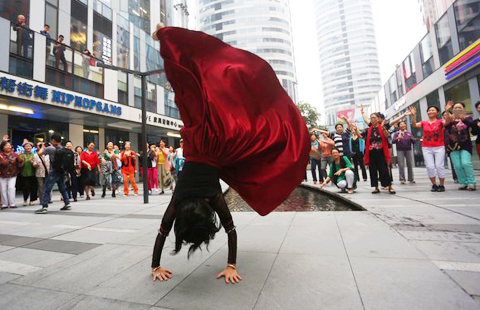Out with white elephants, in with horses
Updated: 2014-10-03 07:54
By Michael Connolly(China Daily Europe)
|
|||||||||||
Chinese industry needs to develop skills for equine training, breeding and handling
The equine industry is an essential part of the world leisure market, particularly in countries where the horse has a special significance, like Europe, the Middle East, and certainly China.
In all those markets, horse-riding is a pleasure that a big segment of the market would enjoy. But apart from the leisure and fun of riding horses, some countries would need a professional industry to support the funding element of equine sports.
For example, in countries like Britain and Ireland a professional industry exists and generates a majority of the revenue for the equine industry.
Conversely, in countries like Germany and North America, the leisure market generates a larger share of revenue. There is a professional sector of course in Germany and North America too, but their existence is not essential to the equine industry's survival.
A professional industry means a regulated horseracing and equestrian sector, where all the commercial elements make sense and functions well.
For example, in the horseracing industry an important element of making the industry financially viable is betting. Money placed for bets supports the horseracing and breeding industries.
Other income from professional horse races would be generated through event sponsorship, ticket sales and money collected from stores displaying at the venue.
But in markets like Germany and North America, the leisure market of horse riding completely supports itself, as the market exists in a state that many middle class couples have enough disposable income to buy a pony for their children to ride for leisure.
The leisure market thrives where professionals with high levels of disposable income can spend between 700 pounds ($1,100; 900 euros) and 3000 pounds a month to place their loved ones in livery stables, where they are cared for to varying degrees and brought out so that mainly female youngsters can demonstrate their equestrian prowess. In countries with less disposable income among the middle class, the pet horse is in the minority, the reserve of the wealthy.
As China's equine industry is just at the beginning to develop, many people are curious to see what path it will take. One major restriction is the lack of legal betting, which means the industry finds it difficult to sustain itself financially.
Some people argue that sport funding through betting and sponsorship has led to the highest level of performance and professionalism, while others feel it has led to the sport being tainted by gambling and addiction and cheating.
But the fact is that the global industry would simply not be as big as it is today without funding from the betting industry. Some experts have said that China could take the path of the Middle East, where the industry is funded not by betting but disposable incomes of the superrich, but this would be unlikely.
It is estimated that more than $6 billion has been invested in race tracks and equestrian stables across China from domestic and foreign investors since the late 1990s.
But as the Chinese government has banned betting, many of these investments remain white elephants. Some are already heavily overgrown or have indeed been converted for other uses. It is quite simple really: in China racing without betting will not allow the sport to grow to a scale the Chinese market demand can potentially create.
The hope is that some day betting will be allowed in China's horse sports to support the development of racing facilities.
This is because China does not have an average income high enough for it to replicate the US or German model, and it does not have a superrich class that would support the horseracing industry like that of the Middle East.
But having said that, China's sheer population makes it unique because even if one percent of the population, or one percent of China's middle class consumers ride horses, the leisure market is bound to be huge. So it will be interesting to see if the Chinese model will grow to define itself as something completely new.
While the hope is for betting regulations to open up and for China to develop a professional equine industry that would finance itself, China also needs to simultaneously develop true love and skills for training, breeding and handling horses to truly emerge as a world player in the horse game.
This process has begun with the emergence of sponsorship, the significant increase in the number of stables and equestrian events, and they are attracting considerable media attention with national broadcasts on CCTV.
Show jumping and other equestrian events are small in China, but have great potential to grow, because they are not restricted by the ban on betting. This is because equestrian events make most of their revenue through sponsorships, ticket sales and registration fees paid by pop-up stores selling products at the events.
Equestrian events represent the part of the market most likely to viably finance itself, and fortunately they are now starting to grab the hearts and minds of increasingly more Chinese audiences.
Like everything in China, the emergence of the equestrian industry is something that will be uniquely Chinese. After the success of the Beijing Olympics in 2008 and the Asian Games in Guangzhou in 2010, China's ambition to become a world power in all things, including equestrianism, is unabated. As a stakeholder, I wish my Chinese counterparts good luck.
The author is group exports director of Connolly's Red Mills, an Irish company that produces food for horses and other animals. The views do not necessarily reflect those of China Daily.
(China Daily European Weekly 10/03/2014 page12)
Today's Top News
China to start direct yuan-euro trade
Protest disrupts life in Hong Kong
Slim waist fad causing problems
Americans split over role of gov't in their lives: Gallup
Spanish diplomat killed in Sudan
Independence of MH17 probe 'crucial'
Illegal assembly in Hong Kong leads to clashes
Aggrieved firms 'should go to court'
Hot Topics
Lunar probe , China growth forecasts, Emission rules get tougher, China seen through 'colored lens', International board,
Editor's Picks

|

|

|

|

|

|





